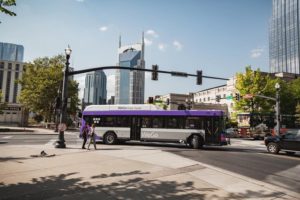Nashville mayor proposes fully funding the city’s public transportation
 In what Nashville Mayor John Cooper said is, “the largest funding of transportation that we’ve ever seen,” he proposed $53 million in funding for WeGo Public Transit services, restoring the $22.3 million cut from last year’s budget, plus extra for inflation.
In what Nashville Mayor John Cooper said is, “the largest funding of transportation that we’ve ever seen,” he proposed $53 million in funding for WeGo Public Transit services, restoring the $22.3 million cut from last year’s budget, plus extra for inflation.
Glenn McGehee, TMA’s chairman of the board and president of SouthStar, LLC, commended Cooper’s support of Nashville’s public transportation.
“As a regional leader in providing innovative commute options to Middle Tennesseans, TMA applauds the Nashville Mayor Cooper’s plan to restore WeGo funding,” McGehee said. “Public transportation options are critical to the economic success of the cities and communities throughout our region. Investing in transit is an investment in jobs, accessibility and community improvement.”
Other transportation initiatives addressed in the recent annual State of Metro address included a traffic management center, doubling bike lanes, building or repairing 75 miles of sidewalks and a new, fully staffed Nashville Department of Transportation.
“Our future requires investment in infrastructure. We must be smart investors,” Cooper said in outlining his transportation plan. “In total dollars, this will be the largest funding of transportation that we’ve ever seen.”
These investments will benefit thousands of Nashvillians who rely on public transportation services every day.
“Last year, WeGo was able to absorb a budget cut from Metro during a very difficult year for the city due to available funding from the federal government,” said Gail Carr-Williams, chair of the Nashville Metropolitan Transit Authority (Nashville MTA) board. “With Mayor Cooper’s budget proposal this year, we look forward to stabilizing service and actually increasing service levels as early as this fall.”
Traffic and congestion — an increasing challenge to commuters as Nashville and Middle Tennessee have rapidly grown — will be addressed with a planned Traffic Management Center to manage congestion with the use of connected “smart signals,” Cooper said.
Also as part of Metro’s Transportation Plan, Cooper is forming and staffing a Department of Transportation.
“We will double our capacity for traffic calming, bike lanes and capital projects,” Cooper said. “I’m sending my senior transportation advisor, Faye DiMassimo, to help launch the DoT.”
“To solve a persistent frustration in Nashville, Faye and her team will improve sidewalk construction times by 50 percent and reduce costs by 20 percent within 12 months, as we work to build and repair 75 miles of sidewalks,” he said. “We must make these smart, neighborhood-focused investment to keep Nashville on the move for generations.”
